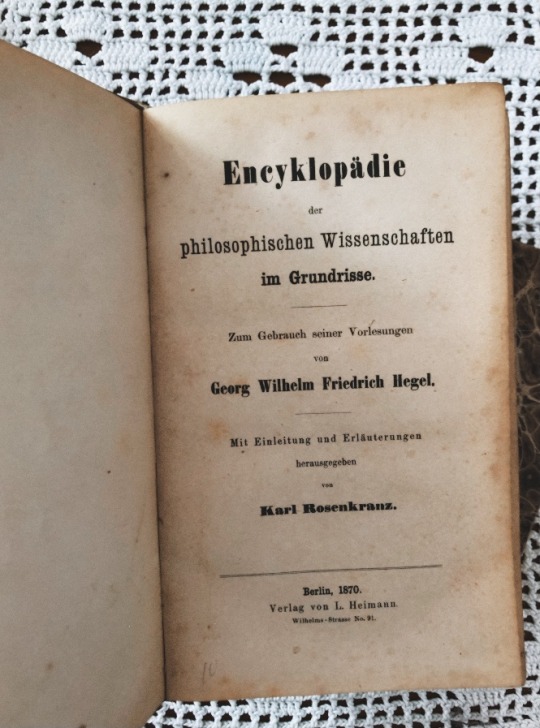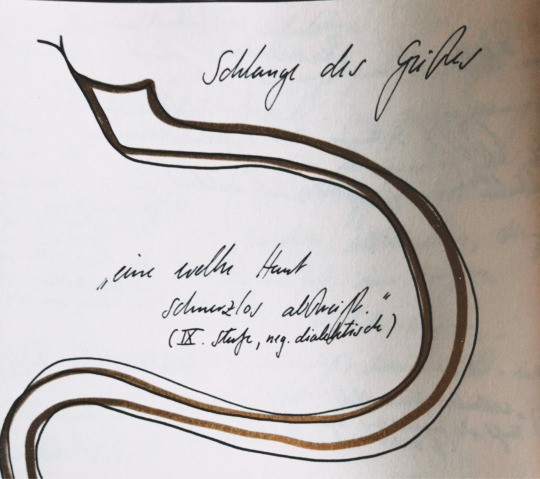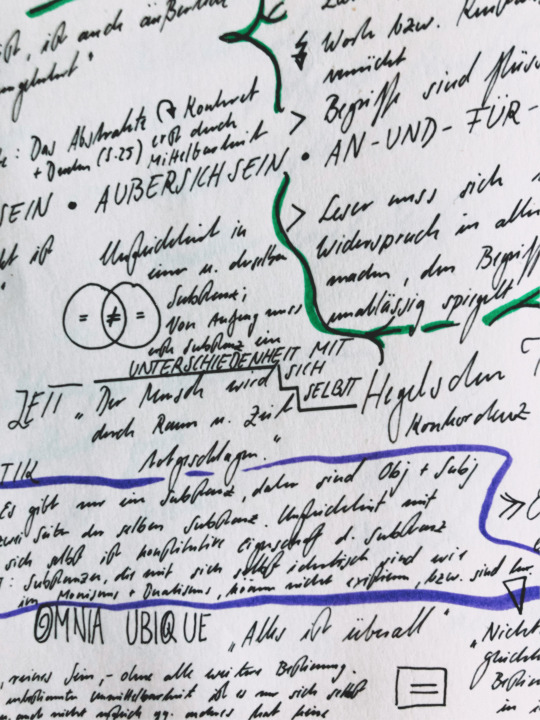#dialectic method
Explore tagged Tumblr posts
Text
Voyage of Discovery: Hegel and his philosophical work [Part II] “One cannot speak of an injustice of nature in the unequal distribution of possessions and resources, for nature is not free and is therefore neither just nor unjust.”


Georg Wilhelm Friedrich Hegel (1770 - 1831) published „Grundlinien der Philosophie des Rechts. Naturrecht und Staatswissenschaft im Grundrisse“ in 1821. In the preface he describes the idea of justice, the term of right and it's realization. The concepts of free will and freedom are interlinked to underline the theory, that the free will can only realize itself in a (reasonable) legal system. Hegel defines “right” [Recht] as the existence of the free will in the world (PR §29). So a philosophy of right is necessarily a philosophy of freedom that seeks to comprehend freedom actualized in how we relate to each other and construct social and political institutions.
“Once the state has been founded, there can no longer be any heroes. They come on the scene only in uncivilized conditions.”

During the last few years I have repeatedly come across Hegel and his dialectics. In the philosophy class we dealt with his dialectics in order to better comprehend Marx's understanding of history and historical materialism. To quote Lenin: "It is impossible completely to understand Marx's Capital, and especially its first chapter, without having thoroughly studied and understood the whole of Hegel's Logic." However, their approaches differ in certain respects, especially in their differing versions of the relation between consciousness and life. While Hegel formulates, that consciousness determines life, Marx, on the contrary, states "(...) life determines consciousness". So this is not only a central question of cognitive ability from an ontological point of view, but to truly understand the hierarchical opposition or relation of consciousness to the human being, vice versa. When I was devouring Schopenhauer three years ago, I often thought of Hegel, who was giving his lectures at the same time, which were attended far more frequently. When I was dealing with the biography of the poet Hölderlin, I found out that Hegel, Schelling and Hölderlin shared a room in the Tübinger Stift. Imaging how these three high spirits inspired and strengthened each other. During my studies I encountered Hegel again in the philosophy of law and in criminal law. The spark jumped with the statement, that the criminal must be be honoured as a reasonable man, because
„Denn in seiner [des Verbrechers] als eines Vernünftigen Handlung liegt, daß sie etwas Allgemeines, daß durch sie ein Gesetz aufgestellt ist, das er in ihr für sich anerkannt hat, unter welches er also als unter sein Recht subsumiert werden darf." In brief: The "reasonable" criminal is breaking a rule, but at the same time, he is forming a new, possible right.
„Daß die Strafe darin als sein eigenes Recht enthaltend angesehen wird, darin wird der Verbrecher als Vernünftiges geehrt. – Diese Ehre wird ihm nicht zuteil, wenn aus seiner Tat selbst nicht der Begriff und der Maßstab seiner Strafe genommen wird; – ebensowenig auch, wenn er nur als schädliches Tier betrachtet wird, das unschädlich zu machen sei, oder in den Zwecken der Abschreckung und Besserung.“ Speaking of crime as an "evil" and punishment as a form of compensating "evil" falls too short and tempts to focus too much on the intention of the criminal and thus leads to "recharge" the punishment morally and psychologically, which has no fruitful function. Again for better understanding:
It is not the criminal who can question the law, but only Society that recognizes infringement as a new right. It therefore requires one clarification that the (new) law set by the criminal does not apply if it should not be recognised. Penal Theories are deffining penalty purposes, aspects of justice (cf. ius talionis "an eye for an eye, a tooth for a tooth") and are also considering the soundness of mind and how crimes can be prevented. Hegel was a representative of Absolute Penal Theories like Kant, both advocated death penalty [!] and the central aspect "restoring justice", could not explain, why penalty is needed. Also the Absolute Penal Theory is forbidding considerations of utility and meaning of the punishment (e.g. therapeutic offers), explaining this view with incompatible with the "dignity and freedom of men". Continues in the second part.



#philosophy#epistemology#ontology#dialectic thinking#dialectic method#Hegelian dialectic#georg wilhelm friedrich hegel#Hegel#antiquarian book#19th century literature#reading
6 notes
·
View notes
Text
“The man who makes everything that leads to happiness depends upon himself, and not upon other men, has adopted the very best plan for living happily. This is the man of moderation, the man of manly character and wisdom.”

Plato, born Aristocles, was an ancient Greek philosopher of the Classical period who is considered a foundational thinker in Western philosophy and an innovator of the written dialogue and dialectic forms.
Born: Classical Athens
Died: Athens, Greece
Founder of the Academy: Plato founded the Academy in Athens around 387 BCE, which is often considered the first institution of higher learning in the Western world. The Academy remained an influential philosophical and scientific research centre for several centuries.
Socratic Dialogues: Plato is best known for his dialogues and written works in which he uses the character of his teacher Socrates to explore philosophical ideas. These dialogues cover various topics including ethics, politics, metaphysics, and epistemology. Famous examples include "The Republic," "Phaedo," "Symposium," and "Timaeus."
Theory of Forms: One of Plato's central philosophical concepts is the Theory of Forms. According to this theory, the physical world is not the true reality but rather a shadow of the true reality, which consists of abstract, perfect, unchanging forms or ideas. For example, all circular objects are imperfect copies of the perfect form of a circle.
Influence on Western Thought: Plato's work has had a profound and lasting impact on Western philosophy and science. His ideas laid the groundwork for much of Western metaphysical and epistemological thought and influenced later philosophers, including his student Aristotle and many medieval and modern thinkers.
Political Philosophy: In "The Republic," Plato presents his vision of an ideal state, ruled by philosopher-kings. He advocates for a society governed by wisdom and reason rather than power or wealth. His political philosophy addresses justice, the role of the individual within society, and the importance of education and virtue.
#Philosopher#Ancient Greece#Academy#Socratic Dialogues#Theory of Forms#Metaphysics#Epistemology#Ethics#The Republic#Political Philosophy#Allegory of the Cave#Phaedo#Symposium#Timaeus#Idealism#Philosopher-King#Dialectic Method#Socratic Method#Classical Philosophy#Athenian#quoteoftheday#today on tumblr
1 note
·
View note
Text
“Children have a natural grasp of the dialectical method; whether it arises from obstinacy or playfulness, the sudden declaration of “Opposite Day”, and an insistence that thenceforth all immediate paradigms must be turned on their head, is a common rhetorical device found on playgrounds or in classrooms…”
- Ignus Nilsen, A Guide to Raising Revolutionary Children
#am I joking or not#actually when I was a kid I made up this game I really wanted to play with people#and would bug my family about it#where they would say a statement that’s true and I would try to find a way that it wasn’t#and then we would have to make it more true and thus harder for me to find an exception#like: the sky is blue - the sky is sometimes gray or black - the sky is blue on a clear day - but not on other planets#and that feels at the very least adjacent to dialectic#maybe i was just a freak#also maybe it isn’t adjacent to a dialectic but it’s just my own weird ass method that also works somehow
52 notes
·
View notes
Text
I can't be allowed to watch adventure time because I will talk like the characters for the rest of my life
#i already always accidentally pick up slang and methods of talking from shows that DON'T create their own almost-dialect#i do not need to be saying oh my glob or say things with the cadence of “dude i don't like that”#it's for everyone's own good
6 notes
·
View notes
Text
I used to think that way, but being immersed in text/chat life makes you realize that it's just another informal form of emphasis which (like someone else pointed out) is a dialect only available in text form. It exists the same way the subtle differences in not using any caps, or using all caps, or not using punctuation, or using inappropriate punctuation, or including a space before an exclamation point exists. Or like using multiple commas is different from using an ellipsis. It's obviously not pronounceable in the normal way, but it conveys different and more subtle meanings than formal writing does.
"hugeeeeee" means your emphasis is on the G, and maybe you also draw out the u (if you were to pronounce it, maybe it sounds like huu-jah). But it also originates just from long-pressing the last letter, which is a very physical form of emphasis, so it relates very much back to the act of texting itself, carelessness, and how that person was feeling at the time, which also makes it very funny.
"omggggggg" obviously is just the short hand of "oh my gooooood!" or even "oh my goddddddddd!" which is pronounced the same but with an emphasis on the D. Same origin as above.
The way these kinds of things convey subtle differences, which are clear enough that there's actual purpose in writing them one way over the other, is actually really cool.
Of course, you have to realize this is all informal text, and if you were going to write something formal or professional, or even just a fanfic, it looks super amateurish to do this. If you want to look like you have a competently written piece, you should find better ways to provide the emphasis you want.
i get so annoyed when people extend a word incorrectly. what do you mean you had a "hugeeeee" burger. dont you mean a huuuuge burger? are you saying "huge-eeeeeeeee" out loud huh??? you start buzzing like a damn mosquito? well i fucking kill those. so watch out
#it's actually very cool and fun to write this way lolllllllll#8)#it adds a certain flavor of whimsy and humor#other people have written about text dialects that are only available in text form#and this is just more of the same#but yeah if you want a competent-looking piece find another method#I don't care about this in text or chat#but someone using it in a fic says that the person does NOT know the real differences in emphasis or how to use them correctly#or how to convey emphasis with proper tools#and that bothers me enough to take me out of believing the story. XD#writing#writing tips#commentary#XD#XDDD even
50K notes
·
View notes
Text
Some of the biggest fantasy worldbuilding fails that I see, in no particular order
Gods without religion. The Gods are real and a known historical fact, but virtually nobody is religious.
Cultural racism/discrimination without structural racism/discrimination. Discrimination that exists only in microagressions or mean comments, without existing in any sort of structural way.
Secret history with no clear reason for it to be secret and no clear method for maintaining that secrecy. Major parts of the world's history are kept entirely secret, even though there's not an obvious reason to do so and even when history has shown this is virtually impossible to enforce (especially in a world with any movement or communication across borders).
Large, homogeneous countries. Even without immigration, virtually no country larger than the Vatican will be fully homogeneous in terms of culture, dialect, beliefs, traditions, etc., much less a large one with limited communication technology as is often seen in fantasy. The Planet of Hats problem.
16K notes
·
View notes
Text
forever misunderstood as
apoplectic instead of dialectic
😤🫥🫥🫥🫥🫥🫥
#haters get on my level#it's just as verbose but it ain't evil#shit is legit sorry The Internet's influence of “”discourse“” and reddit Ackshully type shit and political pedants have distorted your#perception of.... different methods of communication/evaluation or interaction esp with conversations and “debates” and assertion that#talking is the opposite of action 100% of the time#dialectics#no one will ever guess I grew up distilling and understanding the world while heavily influenced by dialectical therapy and thought modes#personal#to pin
0 notes
Text
disabled people who may speak or write differently than the norm
not only are there no bad languages there are also no bad or annoying dialects
#Not quite a dialect but certain things — like autism or Down Syndrome — can come across in the voice#irregular prosody can kind of be categorized into different types of irregular prosody#Like lisp + fast and “nerdy sounding” VS intricate and methodical like Data from Star Trek#VS unclear pronunciation VS too loud or quiet#VS “talks like a kid but isn’t”
45K notes
·
View notes
Text
Tagging @fierceawakening because it's thoughts regarding mostly the prison abolition argument I've been reading on your page, but not about any specific thread that feels reasonable to reply to.
So personally, I don't really think about this too much because in practice I'd much rather focus on specific achievable harm reductions I can currently fight for, however, I have another complication with prison abolition.
I agree that involuntary confinement is problematic, but I've also seen it work? Like my grandfather went to prison, and he says it saved his life and I believe him. I don't think he should've gone to prison in a just system, what he was convicted on was absurd and not reasonable evidence, and it was a non-violent drug crime, which pretty much everyone in the reform to abolition spectrum agree is bad.
At the same time, my grandfather is likely an undiagnosed autistic man, who struggled intensely with adulthood and prison gave him a structured space to learn how to manage himself.
He was lucky enough to be imprisoned in a place where he was given access to education and life skills, similar to what my dad got when his parents paid for a private rehab facility, which was also a form of involuntary confinement. Both of these men in my life returned from these experiences far better able to handle themselves in the world, they both learned important life skills for caring for themselves, and improved their ability to function in employment.
I don't think prisons currently look like this, I know they don't, and I'm pro-reform because of this. I also think that if a fair system were in place it's likely my grandfather should not have been involuntarily commited. (My father had proved a danger to me so he would be comitted in systems advocated by people more on the reform end of the spectrum.) However, it's hard for me to reconcile the idea that all involuntary confinement is inherently bad and that it's only going to make the individuals life worse no matter what. Because the two people in my life who were involuntarily commited (though both very lucky in what services were offered to them in these institutions) both improved their lives significantly because of it.
#I see a lot of people saying non-abolitionists don't have personal experience with the justice system#so I guess part of this is to say#some of us do#Some of us do have family members who were convicted of non-violent drug offences on a wire tap that has a phrase#that is something he regularly says to this day because it's a normal part of his dialect#but as an immigrant it was misconstrued to be proof of involvement#I mean personally I'm very pro making the justice system fully focused on harm reduction#and completely dissolving the connection between the crime comited and the legnth of confinement#and instead having it based soley on risk to society#But in the short term what I'm focusing on is ensuring felons retain the right to vote#that they have access to education and life skills and medical care especially mental health care while in prison#That crimes that do not pose risk to others like drug use or consenual prostitution are no longer crimes#that methods that do have proof of being only bad like solitary confinement or nutriloaf be stopped#I think it should be a last resort to involuntarily commit someone#but there's a difference between that and it being never helpful if that makes sense#This might not be the best phrased thoughts#they've been sitting in my head a while and I don't think I can say them better even if this way isn't fully what I'm intending
1 note
·
View note
Text
Voyage of Discovery: Hegel and his philosophical work [Part II]




Depicted are Ernst Bloch's interpretation of Hegel's dialectic "Objekt - Subjekt" (1951) and Hegel's "Encyclopaedia of the Philosophical Sciences", originally published 1817, this version if from 1870.
"Nature is, in itself a living whole. The movement of its idea through its sequence of stages is more precisely this: the idea posits itself as that which it is in itself; or, what is the same thing, it goes into itself out of that immediacy and externality which is death in order to go into itself; yet further, it suspends this determinacy of the idea, in which it is only life, and becomes spirit, which is its truth." [Encyclopaedia of the Philosophical Sciences: The Philosophy of Nature, §195]
Similar to Marx, I came into contact with Hegel during my studies and I couldn't avoid delving deeper into his works, so I got myself a good guide and interpreter to start with, namely the work of Bloch. Bloch does not claim to write a book about Hegel "rather one about him, with him, through him." Mentioning the problem of access, Bloch was also aware of this and devoted himself extensively to Hegel's artificial language in the first part. Is it an unnecessary complication or does it serve a systematic purpose?

It is striking that Hegel uses certain words differently. The word predicate, for example, has a special meaning in Hegel's philosophy. It refers to the properties or characteristics that can be attributed to an object. Hegel uses the word predicate in his logic to describe the relationship between a subject and its properties. Bloch states: "The reader must familiarize himself with the objective contradiction in all things that Hegel's conceptual language incessantly reflects." Similiar to Christian Wolff and Thomasius, Hegel wanted "to teach philosophy the German language" and some of his terms (Weltgeist, Zeitgeist, ...) are regularly integrated into philosophical systems. The basic ideas of Hegel's philosophy would be the grasping of being, not the draft of an ought (cf. criticizing Kant). Showing the reasonable in the real contradictions and dialectically resolving them. The thesis of Hegel's dialectic describes, that there is just one substance, therefore object and subject are two sides of one and the same substance. Difference within itself is constituve attribute of the substance. Hegel is critizising the monism and dualism here: Substances, which are identical within themselves, can not exist, more precisely, they are empty. "Nichts, das reine Nichts; es ist einfache Gleichheit mit sich selbst, vollkommene Leerheit, Bestimmungs- und Inhaltslosigkeit; Unentschiedenheit in ihm selbst." "Sein, reines Sein, - ohne alle weitere Bestimmung. In seiner unbestimmten Unmittelbarkeit ist es nur sich selbst gleich und auch nicht ungleich gegen anderes, hat keine Verschiedenheit innerhalb seiner noch nach außen." So in the Hegelian system, substance = subject. The impossibility of the subject to grasp the subject in its entirety is the impossibility of the one substance to grasp itself in its entirety. Unlike Kant, Hegel is seing the question of the first substance and the dimensions of epistemology in an ontological level, the impossibility of true perception is not grounded in epistemological issues, but in the substance. The task is to develop a new unity of the term using the dialectical method: I. Immediate unity of the term (Stage of abstract mind - simple thesis) II. Opposition of the term to itself (Stage of negative rational reflection - antithesis) III. Reunification of the term with itself through the abolition of the opposition (Stage of positive rational mediation - negation of negation - synthesis)

Dialectic "burrowing like a mole" a la Hamlet's father spirit - Notes:
Mediation of thinking with the being, the ego and the non-ego
SUBJECT + OBJECT Subject is brought through the world, as subject + object are merging into each other "The subjectivity, according to which the organic is as an individual, develops into an objective organism."
The subject has experienced all of its alienations and objectifications until it empties itself of these alienations and has become comprehended history or absolute knowledge
We also find further dialectical systems in Socrates' postulate of not-knowing, likewise in the platonic-Socratic conversations. In his early years, Hegel was also influenced by mystics, with Eckart, Tauler and Baader forming "the divine triangle" for him (Hegel's triads appear again and again, the basis of his dialectic: -> bud - bursting blossom - fruit -> crime - punishment - justice ) Jakob Böhme significantly influenced Hegel through the "dialectically necessary reference" for example light to darkness, goodness to anger (dialectic of negation). Hugo of St. Viktor was the first to rationally grade the cognitive faculty (levels of intellectual activity), and Hegel also formulated an ascending cognitive faculty in his theory of levels: consciousness, self-confidence, reason, spirit, religion and finally absolute knowledge. „Draußen mag eine neue Welt in Anfahrt sein: Das absolute Wissen hat alles erinnernd hinter sich, erinnernd in sich. Nichts mehr ist zu tun, als die Lehrjahre des Bewusstseins, als die Faustfahrten des Subjekts in er Erinnerung zu wiederholen.“ Nicholas of Cusa also created a graduated system according to dialectical comprehension: Sensus, Ratio, Intellectus, Visio.

[...] The journey with Hegel just started and his dialectic is still relevant, discussed and even nowadays used by others philosophers, just to mention Slavoy Zizek, who is often emphasising the differences of Marx and Hegel, calling himself rather a Hegelian, than Marxist. The materialistic system of Marx is also not extensive and profound enough to find proper solutions, but which system and thought can be considered as flawless? There are many up-lifting points in Hegel's philosophy, I am sorry, that I can not present all those points, like... ... panlogism - hen kai pan "one and all" ; Idea of Logos, object + subject are communicating; alogical cause of world (cf. Schopenhauer), question of comprehension and comprehensibility, form of historical process = form of epistemological process, light of God + eye of the word (Weltauge) = recognisability (cf. Malebranche) ... art as the door to the absolute knowledge, healer of the impotence of nature and at the same time the business of illusions ... ethicosmic mindset found in the constant and deliberate oscillation between subject and object; Self-knowledge = World knowledge; Pan as spatial pathos of order; omnia ubique ~ "all is everywhere" (cf. Leibniz, Casanus) I would like to end with one of my favourite quotes of Hegel:
"If one begins to philosophize, one must first be a Spinozist; the soul must bathe in this ether of substance."

#philosophy#epistemology#ontology#dialectic thinking#dialectic method#Hegelian dialectic#georg wilhelm friedrich hegel#Hegel#antiquarian book#19th century literature#reading#Ernst Bloch#Spinoza#panlogism#pantheism#ethicosmic#theories of law
1 note
·
View note
Text
TAKAHISA OISHI - The Materialist Interpretation of History and Marx's Critique of Political Economy
The Materialist Interpretation of History and Marx’s Critique of Political Economy TAKAHISA OISHI Professor of Economics Takushoku University Tokyo, Japan Introduction In my latest paper[1], I examined the editing problems of “I Feuerbach” of The German Ideology (1845-1846)–hereafter FEUERBACH–. Here I am concerned with the so-called ‘materialist interpretation of history’, which has been said…
#&039;association&039; of free men#alienation#association of capital#association of individuals#civil society#classes#Communism#communist society#competition#critique of political economy#dialectical method of inquiry#distribution of labour#division between capital and labour#Division of labour#economic antagonism#estranged labour#estrangement#family#Friedrich Engels#general interest#historical materialism#illusory communal life#intercourse of individuals under particular conditions#Karl Marx#material production of life#materialist interpretation of history#mode of co-operation#mode of cooperation#mode of production#money
0 notes
Text
TAKAHISA OISHI - The Materialist Interpretation of History and Marx's Critique of Political Economy
The Materialist Interpretation of History and Marx’s Critique of Political Economy TAKAHISA OISHI Professor of Economics Takushoku University Tokyo, Japan Introduction In my latest paper[1], I examined the editing problems of “I Feuerbach” of The German Ideology (1845-1846)–hereafter FEUERBACH–. Here I am concerned with the so-called ‘materialist interpretation of history’, which has been said…
#&039;association&039; of free men#alienation#association of capital#association of individuals#civil society#classes#Communism#communist society#competition#critique of political economy#dialectical method of inquiry#distribution of labour#division between capital and labour#Division of labour#economic antagonism#estranged labour#estrangement#family#Friedrich Engels#general interest#historical materialism#illusory communal life#intercourse of individuals under particular conditions#Karl Marx#material production of life#materialist interpretation of history#mode of co-operation#mode of cooperation#mode of production#money
0 notes
Text
i need to be locked away in a monastery. i need to find peace. ineed quiet. i need to achieve an empty mind through inventorising of what is contained therein right now.
#really the dialectical method applies to many things once you learn it#i do need an empty mind but aufgehoben
0 notes
Text
Compatible: Science, Religion & Your Life
#Aristotle#critical thinking#culture#dialectic#domain#evolution#evolutionary biology#God#human nature#hypotheses#Kant#life#method#moral agency#moral agent#perspectives#religion#science#scientific method#second nature#strategic thinking#the good life#uncertainty
0 notes
Text
10 World-Building Aspects You Probably Overlooked
When crafting a fictional world, it's easy to focus on the big picture—epic battles, grand landscapes, and memorable characters. However, it’s also important to flesh out your world-building to create a ‘real’ world. Some aspects to consider when world-building are:
1. Local Cuisine
Consider the types of food your characters eat and how it reflects their culture, geography, and economy. Unique dishes can reveal societal values and local ingredients.
2. Currency & Trade
Explore the forms of currency used and the trade systems in place. This can include bartering, precious metals, or unique items as currency, influencing economic interactions.
3. Timekeeping Practices
Different cultures may have their own methods for measuring time, whether it's a unique calendar system, seasons, or celestial events, affecting daily life and traditions.
4. Cultural Taboos
Consider the unspoken rules and taboos that govern behavior in your world. These can drive conflict and character motivations, adding depth to societal interactions.
5. Local Flora and Fauna
Unique plants and animals can shape the environment and influence the culture, whether through medicine, food sources, or as part of local mythology.
6. Rituals and Festivals
Incorporate unique rituals or festivals that celebrate historical events, seasonal changes, or important life milestones, providing insight into cultural values and traditions.
7. Language Nuances
Explore dialects, slang, or even the use of sign language that reflects the culture and social dynamics, enriching dialogue and interactions between characters.
8. Architecture and Housing Styles
The design and materials of buildings can reflect climate, resources, and cultural values. Unique architectural features can tell a story about the society that built them.
9. Social Hierarchies and Classes
Examine how social structures affect character relationships and interactions. Class distinctions can influence everything from daily life to political power.
10. Environmental Impact
Consider how the natural environment shapes societal behaviours, resource usage, and conflicts. Climate and geography can drive migration patterns and societal development.
Looking For More Writing Tips And Tricks?
Looking for writing tips and tricks to better your manuscript? Check out the rest of Quillology with Haya; a blog dedicated to writing and publishing tips for authors!
Instagram Tiktok
#hayatheauthor#haya's book blog#haya blogs#writing community#quillology with haya#writing tools#writer things#writing advice#writer community#writing techniques#writing prompt#writing stuff#creative writing#ya writing advice#writing tips and tricks#writer tools#writers of tumblr#writer blog#writers block#quillology with haya sameer#writers on tumblr#writerscommunity#writer stuff#author help#author advice#author#writing inspiration#writeblr#novel writing#on writing
6K notes
·
View notes
Text
Researchers found that some artificial intelligence (AI) systems are more likely to recommend the death penalty to a fictional defendant presenting a statement written in African American English (AAE) — a dialect spoken by millions of people in the United States that is associated with the descendants of enslaved African Americans — compared with one written in Standardized American English (SAE). The chatbots were also more likely to match AAE speakers with less-prestigious jobs.
unsurprising but still worth talking about
10K notes
·
View notes